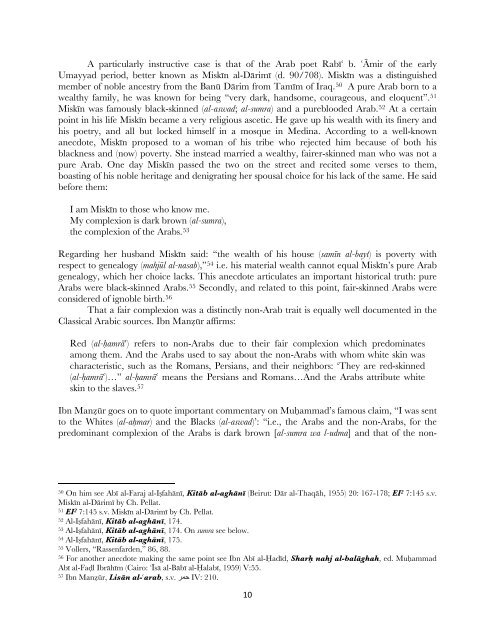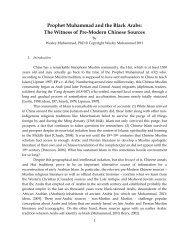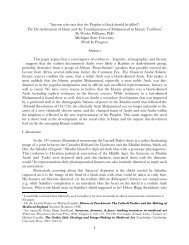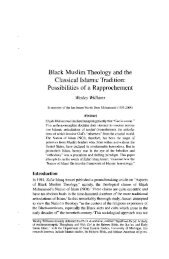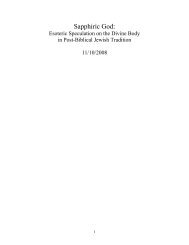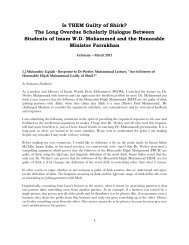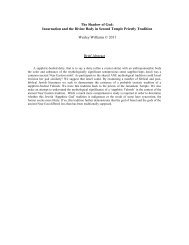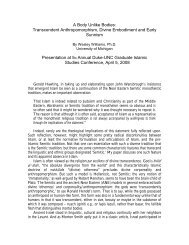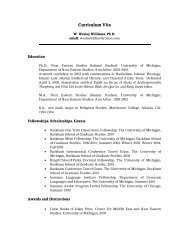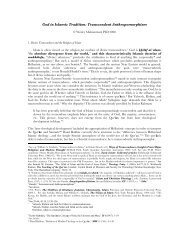“Anyone who says that the Prophet is black should be killed”: The ...
“Anyone who says that the Prophet is black should be killed”: The ...
“Anyone who says that the Prophet is black should be killed”: The ...
Create successful ePaper yourself
Turn your PDF publications into a flip-book with our unique Google optimized e-Paper software.
A particularly instructive case <strong>is</strong> <strong>that</strong> of <strong>the</strong> Arab poet RabÊ# b. #$mir of <strong>the</strong> early<br />
Umayyad period, <strong>be</strong>tter known as M<strong>is</strong>kÊn al-D§rimÊ (d. 90/708). M<strong>is</strong>kÊn was a d<strong>is</strong>tingu<strong>is</strong>hed<br />
mem<strong>be</strong>r of noble ancestry from <strong>the</strong> Banå D§rim from TamÊm of Iraq. 50 A pure Arab born to a<br />
wealthy family, he was known for <strong>be</strong>ing “very dark, handsome, courageous, and eloquent”. 51<br />
M<strong>is</strong>kÊn was famously <strong>black</strong>-skinned (al-aswad; al-sumra) and a pureblooded Arab. 52<br />
10<br />
At a certain<br />
point in h<strong>is</strong> life M<strong>is</strong>kÊn <strong>be</strong>came a very religious ascetic. He gave up h<strong>is</strong> wealth with its finery and<br />
h<strong>is</strong> poetry, and all but locked himself in a mosque in Medina. According to a well-known<br />
anecdote, M<strong>is</strong>kÊn proposed to a woman of h<strong>is</strong> tri<strong>be</strong> <strong>who</strong> rejected him <strong>be</strong>cause of both h<strong>is</strong><br />
<strong>black</strong>ness and (now) poverty. She instead married a wealthy, fairer-skinned man <strong>who</strong> was not a<br />
pure Arab. One day M<strong>is</strong>kÊn passed <strong>the</strong> two on <strong>the</strong> street and recited some verses to <strong>the</strong>m,<br />
boasting of h<strong>is</strong> noble heritage and denigrating her spousal choice for h<strong>is</strong> lack of <strong>the</strong> same. He said<br />
<strong>be</strong>fore <strong>the</strong>m:<br />
I am M<strong>is</strong>kÊn to those <strong>who</strong> know me.<br />
My complexion <strong>is</strong> dark brown (al-sumra),<br />
<strong>the</strong> complexion of <strong>the</strong> Arabs. 53<br />
Regarding her husband M<strong>is</strong>kÊn said: “<strong>the</strong> wealth of h<strong>is</strong> house (samÊn al-bayt) <strong>is</strong> poverty with<br />
respect to genealogy (mahjål al-nasab),” 54 i.e. h<strong>is</strong> material wealth cannot equal M<strong>is</strong>kÊn’s pure Arab<br />
genealogy, which her choice lacks. Th<strong>is</strong> anecdote articulates an important h<strong>is</strong>torical truth: pure<br />
Arabs were <strong>black</strong>-skinned Arabs. 55 Secondly, and related to th<strong>is</strong> point, fair-skinned Arabs were<br />
considered of ignoble birth. 56<br />
That a fair complexion was a d<strong>is</strong>tinctly non-Arab trait <strong>is</strong> equally well documented in <strong>the</strong><br />
Classical Arabic sources. Ibn Maníår affirms:<br />
Red (al-Èamr§#) refers to non-Arabs due to <strong>the</strong>ir fair complexion which predominates<br />
among <strong>the</strong>m. And <strong>the</strong> Arabs used to say about <strong>the</strong> non-Arabs with <strong>who</strong>m white skin was<br />
character<strong>is</strong>tic, such as <strong>the</strong> Romans, Persians, and <strong>the</strong>ir neighbors: ‘<strong>The</strong>y are red-skinned<br />
(al-Èamr§#)…” al-Èamr§# means <strong>the</strong> Persians and Romans…And <strong>the</strong> Arabs attribute white<br />
skin to <strong>the</strong> slaves. 57<br />
Ibn Maníår goes on to quote important commentary on MuÈammad’s famous claim, “I was sent<br />
to <strong>the</strong> Whites (al-aÈmar) and <strong>the</strong> Blacks (al-aswad)’: “i.e., <strong>the</strong> Arabs and <strong>the</strong> non-Arabs, for <strong>the</strong><br />
predominant complexion of <strong>the</strong> Arabs <strong>is</strong> dark brown [al-sumra wa l-udma] and <strong>that</strong> of <strong>the</strong> non-<br />
50 On him see AbÊ al-Faraj al-Ißfah§nÊ, Kit§b al-agh§nÊ (Beirut: D§r al-Thaq§h, 1955) 20: 167-178; EI 2 7:145 s.v.<br />
M<strong>is</strong>kÊn al-D§rimÊ by Ch. Pellat.<br />
51 EI 2 7:145 s.v. M<strong>is</strong>kÊn al-D§rimÊ by Ch. Pellat.<br />
52 Al-Ißfah§nÊ, Kit§b al-agh§nÊ, 174.<br />
53 Al-Ißfah§nÊ, Kit§b al-agh§nÊ, 174. On sumra see <strong>be</strong>low.<br />
54 Al-Ißfah§nÊ, Kit§b al-agh§nÊ, 175.<br />
55 Vollers, “Rassenfarden,” 86, 88.<br />
56 For ano<strong>the</strong>r anecdote making <strong>the</strong> same point see Ibn AbÊ al-\adÊd, SharÈ nahj al-bal§ghah, ed. MuÈammad<br />
AbÊ al-Fa∙l Ibr§hÊm (Cairo: #^s§ al-B§bÊ al-\alabÊ, 1959) V:55.<br />
57 Ibn Maníår, L<strong>is</strong>§n al-#arab, s.v. ﺮﻤﺣ IV: 210.


